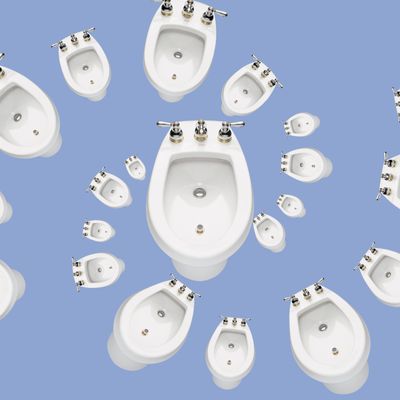
Please note the story you’re reading was published more than a day ago. COVID-19 news and recommendations change fast: Read the latest here to stay up-to-date. We’ve lifted our paywall on all essential news and updates about the coronavirus.
Toilet paper rolls are disappearing from rest stops along I-80. Restaurants in Illinois are offering a free roll with a $20 takeout order. A couple in Corpus Christi stole stock from a diner bathroom by smuggling rolls out under their shirts. Oregon police had to recently beg residents to stop calling 911 to report toilet paper shortages, offering an apocalyptic list of alternatives like “grocery receipts, newspaper, cloth rags, lace,” and, chillingly, “cotton balls.”
Amid the coronavirus-triggered toilet paper panic that has gripped the nation, some Americans feel they have only one recourse: the bidet. The plumbing fixture is suddenly in high demand as panicked shoppers react in fear of a presumptive nationwide shortage of toilet paper (this has not yet happened at the factory level, but that hasn’t stopped the newly bidet-curious). They’re likely responding to images of empty shelves and stocked carts that proliferated on social media and in the news last week, inciting a snowball effect, explains Adam Alter, an associate professor of marketing at New York University’s Stern School of Business. “A few early hoarders drive the rest of the population to hoard by signaling that the product is in short supply.”
Luckily, apostles of the bidet were ready for the crisis, especially those who have been attempting to democratize its porcelain reputation. In the last two weeks, sales are up tenfold for affordable bidet start-up Tushy, founded by Miki Agarwal, the controversial former CEO of period underwear brand Thinx. Tushy launched in 2018 with a press event where guests made their own chains of anal beads; it is one of a slew of companies in recent years to offer a lower-cost version of the bidet washer as an attachment rather than a stand-alone appliance. Traditionally, bidets are separate basins placed next to a regular toilet, and though they are common around the world, including in India, Japan, and elsewhere, they tend to be associated in the United States with fancy, fussy hotels and luxury high-rises. Tushy offers a bidet for the people: a $79 plastic seat attachment that connects to your toilet seat, in millennial-friendly pink, blue, black, and white. The Tushy Spa ($109) connects to your sink for the additional comfort of warm water. Agarwal says that last week, the company did $500,000 in sales on several days, including a day where they hit $1 million, and is ramping up production to meet the need. Tushy has been reposting Instagram stories from new customers with messages like “Y’all are sleeping on bidets,” and “Clean assholes 2020.”
Handheld, nozzle-style bidet attachments run even more cheaply. Earlier this week, posters on neighborhood forum site Nextdoor were recommending models to each other, intoning ominously, “Good luck everyone.” Hanna Berggren and Stephanie Kane, 24-year-old roommates on the Upper West Side, bought one from Amazon for $38.99 on March 15, after finding the stores in their neighborhood sold out of toilet paper. They had heard horror stories about people lining up at dawn only to discover rolls were being rationed. They saw a viral video of women fighting over it in an Australian big-box store. Stephanie runs a sustainable Instagram account and knew of the bidet’s promise of less paper waste (the National Resources Defense Council adds that bidets also use less water to operate than most popular brands require to turn virgin trees into toilet paper). Hanna had seen one in the Tribeca apartment of a wealthy family friend. In a moment of desperation, they decided, “Let’s fucking get a bidet.”
Genevieve Koski, a writer in Michigan, ordered one the same day. She also says she has been considering a bidet for eco-conscious reasons but was induced by the toilet paper panic. She chose a $39.98 attachment from Brondell, a San Francisco based company (and World Bidet Association member) that also reports an increase in sales ten times over across the board. Koski got some bad news about her purchase, however, on Tuesday: The attachment is out of stock indefinitely. Even some members of the bidet community can’t get one — an anonymous retail associate at a high-end luxury showroom, which sells Toto, the Cadillac of bidets, said that he tried to quickly buy himself an attachment but couldn’t find one that wasn’t backordered. A Twitch streamer named DNP 3 has decided to give away bidets to followers, first a $100 model and then a $500 model, “to help.”
Again, there is no toilet paper shortage in the United States at the manufacturing level (although manufacturers are now struggling to meet the demand of fear-addled paper fiends, who show no sign of relenting). “It makes no sense,” Berggren admits. “Coronavirus isn’t going to give anyone diarrea.” Still, clicking “check out” on the bidet gave her comfort.
Professor Alter reasons that there are “plenty of irrational reasons why people might be hoarding toilet paper” during a pandemic. “This is a time when people lack control — we don’t know how bad the virus will get, whether we or our loved ones will get sick, how badly we’ll be affected financially, and so on. During times like these, we look to exert control wherever we can, and panic buying (or any form of consumption or expenditure) is a form of control. ‘I may not be able to control the virus, but I can make sure I don’t run out of toilet paper.’”
However, unless you were already thinking about buying one, “buying a bidet,” considering the temporary shortage, he says, “is an extreme way to cope.”





